PREVENTIVE
Ayurveda is a natural health care system that originated in India more than 5000 years ago. Its main objective is to achieve optimal health and well-being through a comprehensive approach that addresses mind, body, behavior, and environment. Ayurveda emphasizes prevention and health promotion, and provides treatment for disease.
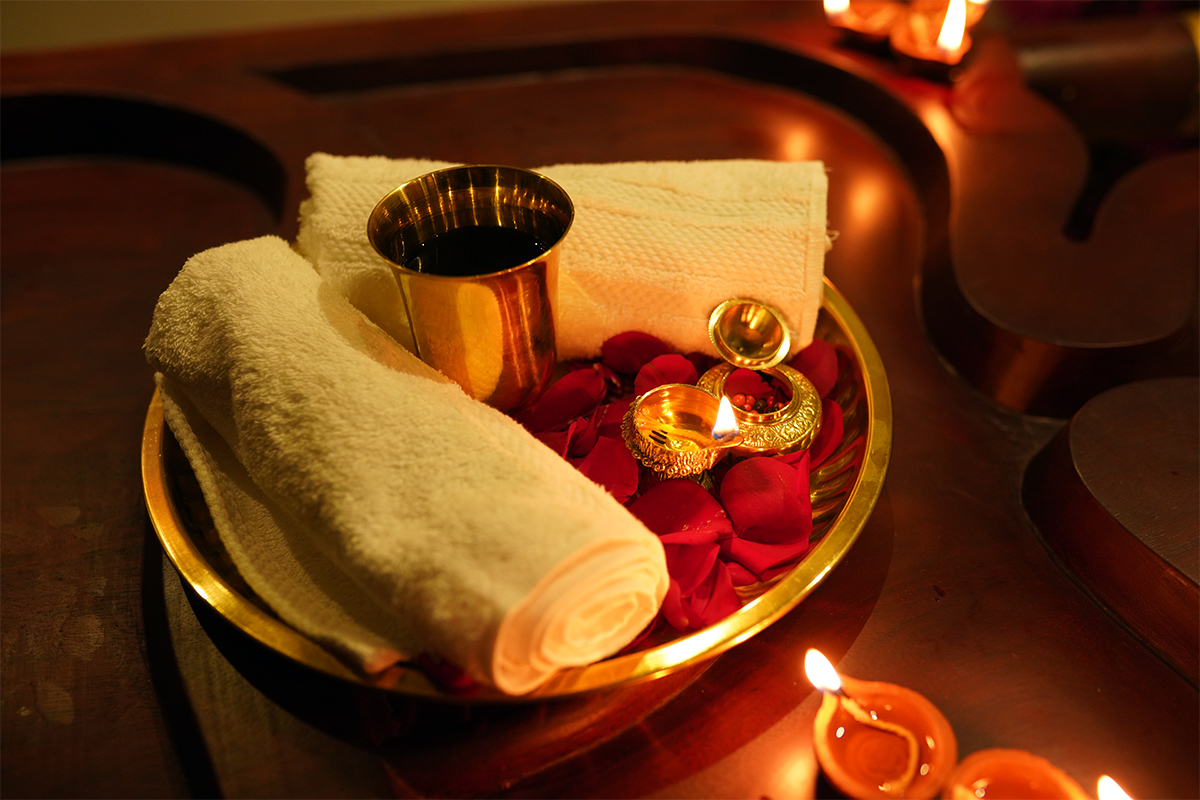
Since health is subjected to constant change under various influences, it is equally important to maintain and promote health as rightly told in Ayurveda “Arogyam Moolamuthamam”.
Here at Kooplicat Ayurveda Hospital, we gave at most importance to “Arogyam” which is not merely a physical health but also mental and spiritual wellbeing.
Ayurveda is a natural health care system that originated in India more than 5000 years ago. Its main objective is to achieve optimal health and well-being through a comprehensive approach that addresses mind, body, behavior, and environment. Ayurveda emphasizes prevention and health promotion, and provides treatment for disease. It considers the development of consciousness to be essential for optimal health and meditation as the main technique for achieving this. Treatment of disease is highly individualized and depends on the psychophysiologic constitution of the patient. There are different dietary and lifestyle recommendations for each season of the year. Common spices are utilized in treatment, as well as herbs and herbal mixtures, and special preparations known as Rasayanas are used for rejuvenation, promotion of longevity, and slowing of the aging process. A group of purification procedures known as Panchakarma removes toxins from the physiology. Whereas Western allopathic medicine is excellent in handling acute medical crises, Ayurveda demonstrates an ability to manage chronic disorders that Western medicine has been unable to. It may be projected from Ayurveda's comprehensive approach, emphasis on prevention, and ability to manage chronic disorders that its widespread use would improve the health status of the world's population.
At Kooplicat Ayurveda Hospital we focus on maintaining balance between body, mind and soul by following inacharya (day regimen), rathricharya (night regimen), ritucharya (seasonal regimen), vargana of nidana sevana (avoiding causative factors), prajnaparada (intellectual error), undergoing ritushodhana (seasonal purifactory methods) etc.
We offer proper guidance to individuals how to inculcate all the above mentioned practices into their daily life. Apart from that classical panchakarma as ritushodhana, soothikaparicharya (post natal care), Karkidaka chikitsa etc, are made available in our hospital.
WELLNESS
Ayurveda is an ancient lifestyle practice which aims to create harmony and wellness within the body. Practised widely in India, it works on the belief that all life forms have a "dosha" - a unique mix of energies known as "vata", "pitta" and "kapha". This is similar to the Western idea of elements - water, fire, earth, and so on.

Ayurveda is an ancient lifestyle practice which aims to create harmony and wellness within the body. Practised widely in India, it works on the belief that all life forms have a "dosha" - a unique mix of energies known as "vata", "pitta" and "kapha". This is similar to the Western idea of elements - water, fire, earth, and so on.
The Sanskrit term 'dosha' is probably the best-known principle of Ayurveda today, the fundamental goal of Ayurvedic practice is to maintain your own innate 'doshic' balance.”
“Initially, there are three doshas, or body types. Vata is composed of ether [space] and air. Pitta is composed of fire and water. Kapha is composed of water and earth. Each one of us has a unique combination of Vata, Pitta and Kapha. But there are also duo and tri-doshic types for example Vata/Pitta or Vata/Pitta/Kapha.”
“Each dosha type has specific tendencies. For example, Vata means 'to move' or 'to enthuse.' Vata people have alert minds, a refreshing imagination, and lots of energy, but they can burn out quickly through over-activity. Pitta means 'to cook' or 'to burn.' Pitta people are skillful and bright. They also get easily offended and can be domineering. Kapha means 'to stick' or 'keep together.' Generally stable and patient, Kapha people are laid back and not easily provoked, but once enraged; it takes some time to calm them down again.”
A person's dosha determines the kind of lifestyle that is balancing and healthy for them, including the sorts of food they should eat and the amount and type of exercise they should do.
Most Ayurvedic spa treatments involve some degree of massage, with therapeutic essential oils personalised to suit your dosha. The massage techniques used include tapping, kneading and squeezing as well as the more traditional massage strokes you would expect. The style and flow of the massage is determined by who you are, and what your body needs for balance and wellbeing at the time. An Ayurvedic therapist is trained to focus on the "marma points" - similar to the pressure points in reflexology, acupuncture and acupressure.
Everybody aspires to lead a healthy quality life. Unfortunately our daily exposure to toxins, pollutants, changing life styles, emotional disturbances doesn’t pare the way for it. Here at Kooplicat, we offer rejuvenation for restoring the disturbed mechanism of body through personalized wellness programmes. We have different wellness packages on Geriatrics, Rejuvinative, Parenthood, Beauty therapy, Bridal and bridegroom Packages, revitalization and relaxation for 3 months, 6 months and 1 year to get rid off toxins and slowly ease into a system of wellbeing.
ILLNESS
Cure for an illness is achieved by herbal treatments and detoxification procedures. Herbs can either be given orally or herbal oils are used externally to provide wellness. Most of the health systems use this type of treatments to cure the health issues.
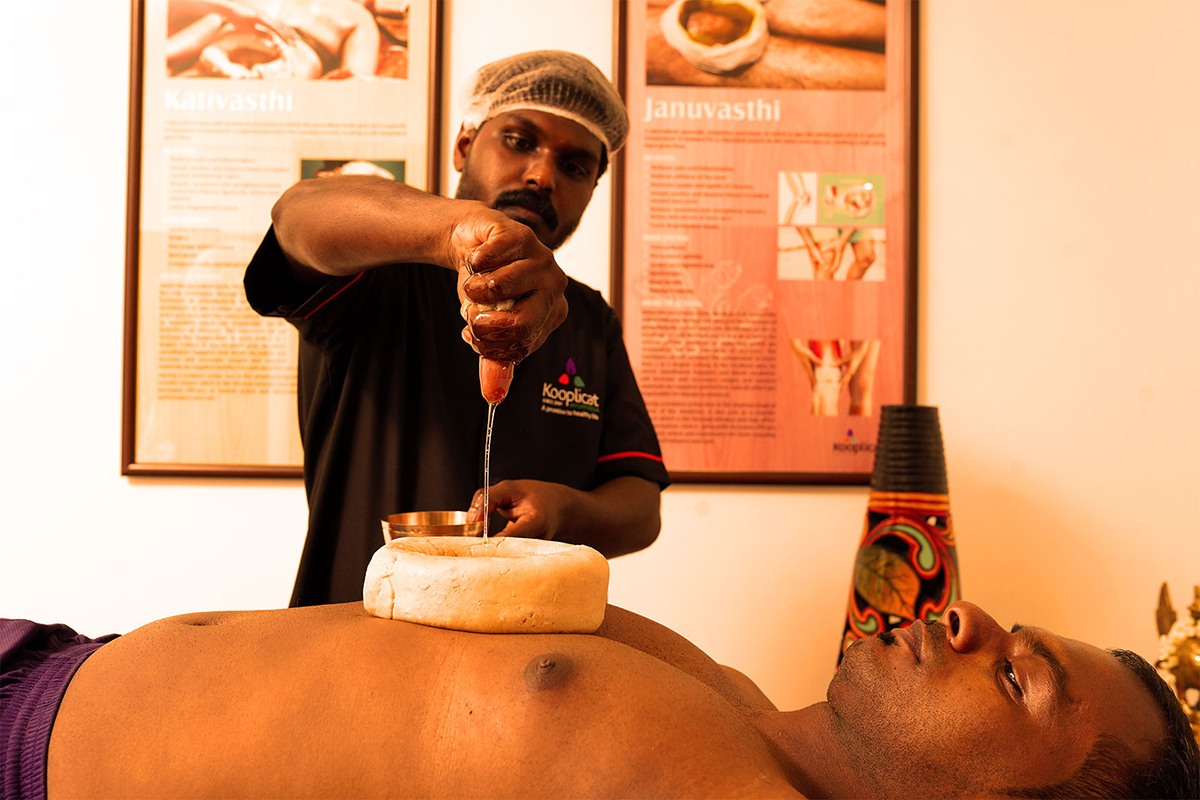
Ayurveda or Ayurvedic medicine is a system of traditional medicine native to India, whichuses a range of treatments, including panchakarma (‘five actions’), yoga, massage, acupuncture and herbal medicine, to encourage health and wellbeing.
A range of Ayurvedic therapies
- Dietary changes
- Herbal medicine, including combining herbs with metals, minerals or gems (known as rasha shastra medicines) that can take the form of pellets, tablets and powders of various colours and scents)
- Acupuncture (practiced by some practitioners)
- Massage
- Meditation
- Breathing exercises
- Panchakarma (‘five actions’) – a specialised treatment consisting of five therapies including emesis (vomiting), enemas and blood-letting, which are meant to detoxify the body and balance the doshas (in Ayurveda, the body’s three vital energies)
- Sound therapy, including the use of mantras
- Yoga.
Kooplicat aims not only to provide instant relief from symptoms but also to restore health by understanding the cause. We strive to attack the root causes by detoxifying and cleansing, strengthening body tissues and balance bodily doshas with internal and external medicines, Panchakarma and other external therapies ensuring complete cure.
CONDITIONS TREATED
A disease is a guide for healing and a signal that it is time to change in order to rebalance the body’s natural state. The symptoms of disease represent an attempt by the body to heal. In Ayurveda, this concept is called “Prayaschita” which literally means “penalty for abuse”. At Kooplicat Ayurveda, our doctors believe their approach is effective in treating a range of disorders, including: Anxiety, Asthma, Arthritis, Digestive problems, Eczema, High blood pressure, High cholesterol levels, Rheumatoid arthritis, Stress, Psoriasis, Polycystic Ovarian Syndrome, Piles, Lumbar Spondylosis, etc....
RHEUMATOID ARTHRITIS
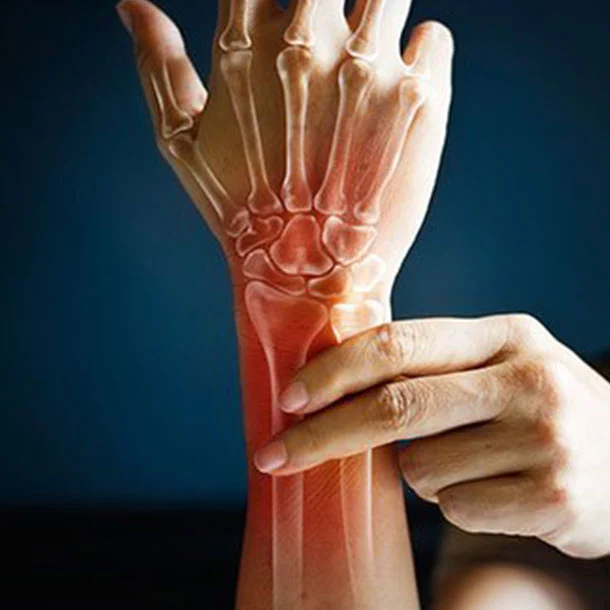
Rheumatoid Arthritis (RA) is an autoimmune disease affecting all age groups, more common in 30-50 years. Women are affected three times in comparison to male. It affects joints and their covering called synovial membrane and in the later stages leads to degenerative changes. During progress of the disease it may affect many other organs such as pleura and pericardium.
Symptoms of RA include:
- Pain, swelling, and stiffness in more than one joint
- Symmetrical joint involvement
- Joint deformity
- Unsteadiness when walking
- A general feeling of being unwell
- Fever
- Loss of function and mobility
- Weight loss
- Weakness
TREATMENT
Ayurvedic treatment for RA is aimed at preserving the functionality of the joints by, preventing joint destruction, keeping the inflammation and the associated symptoms like pain and stiffness under control, to maintain a maximal range of skeletal mobility and to avoid the development of deformities and complications. This is done by eliminating the cause and balancing all the vitiated doshas in the body.
Kooplicat Ayurveda Hospital helps you achieve this through a holistic approach comprising of diet modifications, lifestyle changes, stress management, herbal medication and ayurvedic therapies, yoga and pranayama that helps the body get back to the state of balance and harmony. We offer these individualized treatments after taking whole-body view into consideration which includes the patient’s physical constitution, lifestyle and food habits.
POLYCYSTIC OVARIAN SYNDROME
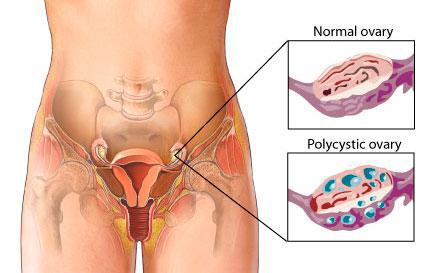
Polycystic ovary syndrome (PCOS) is a hormonal disorder common among women of reproductive age. Women with PCOS may have irregular menstruation, high level of androgens (male hormones), anovulation leading to infertility.
PCOS affects a woman’s ovaries, the reproductive organs that produce oestrogen and progesterone — hormones that regulate the menstrual cycle. The ovaries do not make all the hormones it needs for an egg to fully mature. The follicle may start to grow and build up fluid but ovulation does not occur, instead follicle may remain as cysts. The lack of ovulation alters levels of oestrogen, progesterone, FSH, and LH. Oestrogen and progesterone levels are lower than usual, while androgen levels are higher than usual. Extra male hormones disrupt the menstrual cycle, so women with PCOS get fewer periods than usual.
The common symptoms are: irregular menstruation, heavy bleeding, excess hair growth, acne, weight gain and dark patches of skin especially on the neck.
TREATMENT
Ayurveda’s answer to PCOS is a holistic approach that focuses on wellness therapies, herbal formulations, diet, and exercise. The treatment principle according to Ayurveda is to clear obstruction of vata humor in the pelvis, normalize metabolism and regulate the menstrual system (arthava dhatu).
Kooplicat Ayurveda Hospital in fact has some promising treatments to work on PCOS. It involves the use of herbs to boost fertility and maintain a balance of hormones. It also includes various types of therapies and balanced ayurvedic diet which plays a vital role in overcoming PCOS-related problems.
PSORIASIS
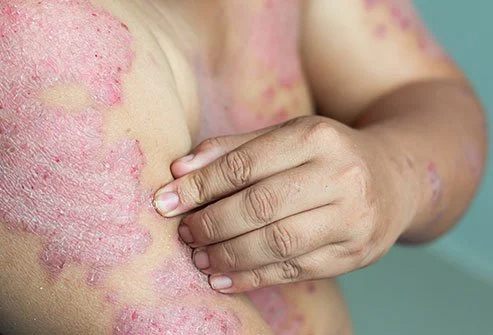
Psoriasis is a long-lasting, noncontagious, autoimmune disease characterized by raised areas of abnormal skin. It occurs when the immune system mistakes a normal skin cell for a pathogen and sends out faulty signals that cause overproduction of new skin cells. These areas are typically red, or purple on some people with darker skin, dry, itchy, and scaly. Psoriasis varies in severity from small, localized patches to complete body coverage.
Psoriasis is the consequence of a sped-up skin production process. Generally, skin cells nurture deep in the skin and slowly rise to the surface. Finally, they fall off. The regular life cycle of a skin cell is one month. But in people with psoriasis, this production development may arise in just like 5 days since skin cells don’t have time to fall off. The fast overproduction leads to the build-up of skin cells.
Scales regularly develop on joints, such elbows and knees. They may grow anywhere on the body, including the hands, feet, neck, scalp and face.
TREATMENT
Management of psoriasis is not very easy but not impossible. Modern science quickly takes the resort of steroids. This could worsen the condition as the disease which is on the skin gets into the deeper tissues because it is being suppressed.
At Kooplicat Ayurveda Hospital, our treatment primarily focuses on blood purification and balancing the vitiated Doshas. Management of psoriasis comprises of detoxification done through panchakarma therapies, administration of internal medication and external applications, rasayana chikitsa (immunomodulation), a strict ayurvedic diet regime, lifestyle changes and stress management. If the patient can implement all the instructions as advised and completely follows the diet regime & healthy lifestyle, psoriasis is completely curable without any recurrence.
PREMATURE EJACULATION
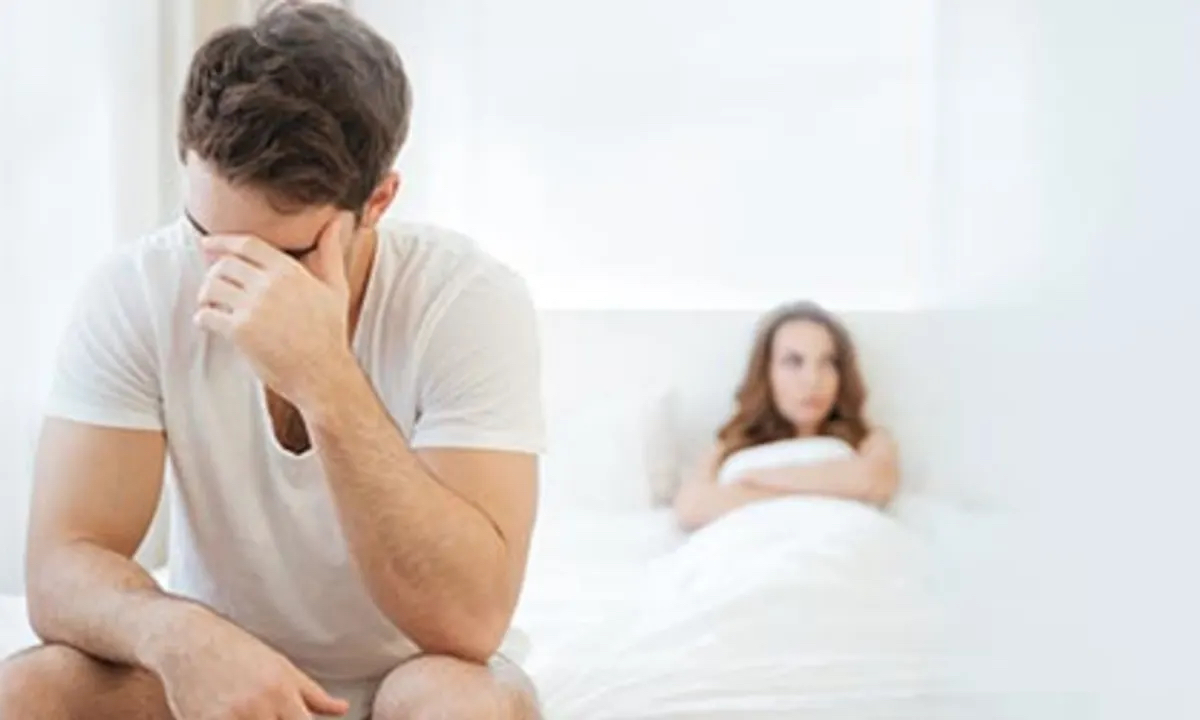
Premature ejaculation is generally regarded as one of the most common male sexual dysfunctions. It (PE) is defined as ejaculation before the completion of satisfactory sexual activity or with minimal sexual stimulation for both partners. In severe cases, it is characterized by ejaculation either before penetration or soon after that. PE affects as many as 1 out of 3 men, and can lead to frustration and anxiety.
The cause of PE could be temporary depression, stress, anxiety, a history of sexual repression, or a lack of emotional bonding between the partners. Physical disease can also be the reason, such as a swollen prostate gland (prostatitis), diabetes, sexually transmitted diseases, or cardiovascular disease.
TREATMENT
Ayurveda has attached importance to sukra (sperm / reproductive system) as the superior tissue of the body due to its generative property. Vajeekarana is a branch of Ayurveda that deals with various types of physical, psychological, sexual problems such as impotence, libido, bad erection and early ejaculation in men, as well as sterility and frigidity in women and these medicines are useful for providing strength and vigor to the person along with improving reproductive potential.
Kooplicat Ayurveda Hospital aims at keeping vata and pitta in balance, through the use of certain drugs and their combinations which acts as vajeekarana (aphrodisiacs) and skukrastambhaka( which delay the ejaculation or arrests premature ejaculation) along with treatment procedures and personalized ayurvedic diet which restores harmony of the body. Problems of stress and anxiety during sexual intercourse are also effectively dealt with rejuvenating herbs, yoga, meditation and counseling.
PILES
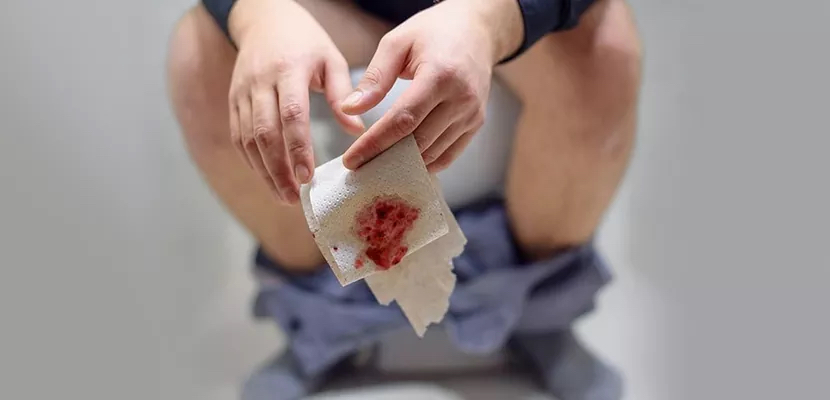
Piles, also called haemorrhoids, are abnormally swollen and enlarged veins in your anus and lower rectum, similar to varicose veins. Hemorrhoids can develop inside the rectum (internal hemorrhoids) or under the skin around the anus (external hemorrhoids). Nearly three out of four adults will have hemorrhoids from time to time.
The signs and symptoms of haemorrhoids depend on the type present. Internal hemorrhoids usually present with painless, bright red rectal bleeding while defecating. External hemorrhoids often result in pain and swelling in the area of the anus. If bleeding occurs it is usually darker.
There will be other symptoms like
- Itching in anal region
- Painful bowel movements
- Feeling of a lump in the anus especially during straining
- Frothy mucus discharge with stool
- Constipation
- Painful defecation
TREATMENT
In the treatment of hemorrhoids, as in principle and for any disease, Ayurveda’s primary goal is to restore the energy balance that nature has put on the person. With recovery, the body re-starts to function optimally and becomes a system that self-regulates, self-purifies and develops. So there can be no basis for disease.
Kooplicat Ayurveda Hospital offers safe and effective treatment options to patients who are diagnosed with internal or external hemorrhoids through complete natural and customized ayurvedic procedures and herbal medications that pacify the doshas and causes of the condition. Along with the treatment procedures, we also focus on the overall well-being of the patient through appropriate diet plan that prevents recurrence and rejuvenates the body system for well-being.
LUMBAR SPONDYLOSIS
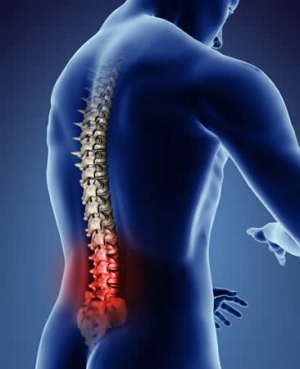
Lumbar spondylosis, also known as spinal osteoarthritis can be described as all degenerative conditions affecting the discs, vertebral bodies, and associated joints of the lumbar vertebrae. It narrows the space between spinal vertebrae and neural foramina and is commonly presented as low back pain. It affects approximately 60 to 85% of adults during some point in their lives, particularly after middle age.
As age progresses, the spinal discs lose moisture, shrink, narrow, bone spurs develop, and bones become weaker, leading to symptoms such as:
- Intermittent back pain that may even radiate to extremities
- Joint or muscular stiffness upon awakening.
- Muscle weakness and/or tingling in the back, buttocks and legs.
- Numbness or loss of sensation in the affected areas.
Apart from aging, the other causes of lumbar spondylosis are: injury/ trauma, sitting for long time and repetitive use of body parts mainly due to job nature.
If the spondylosis is allowed to progress, it can lead to a narrowing of the spinal canal, resulting in impingement of the spinal cord, which can cause poor bladder control, unsteady gait, and other severe neurological problems.
TREATMENT
Treatment in ayurveda for Lumbar spondylosis is to bring the vitiated vata dosha back to the state of equilibrium and thereby to the state of health.
The team of doctors in Kooplicat Ayurveda Hospital helps you achieve this through the use of herbal medicines and external therapies which effectively relaxes the muscles, relieves inflammation to the nerves and its surrounding tissues. We also provide treatments that nourish muscles and nerves thus rejuvenating the degenerated vertebral disc thereby preventing further degeneration. Apart from internal and external treatments diet and lifestyle modifications are also advised and certain yoga postures are also taught for a better quality of life.
DIABETES MELLITUS
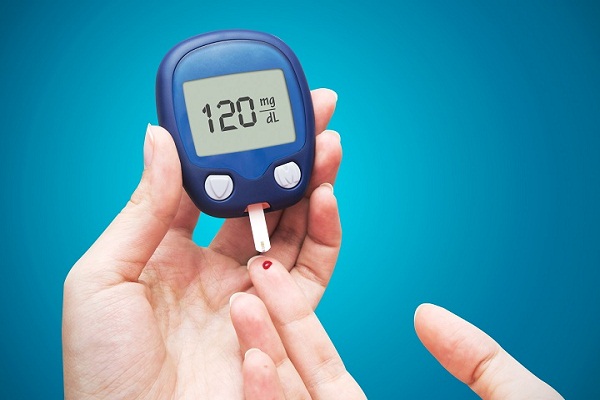
Diabetes mellitus (DM), commonly referred to as diabetes, is a chronic metabolic disorder in which there are high blood sugar levels over a prolonged period. Diabetes is due to either the pancreas not producing enough insulin or the cells of the body not responding properly to the insulin produced.
Insulin is the principal hormone that regulates the uptake of glucose from blood. If there is less production of insulin or cells become insulin resistant, there would not be absorption of glucose in the body nor it gets stored in the liver, thus the glucose increases in the blood stream increasing the blood glucose level.
There are three main types of diabetes mellitus:
- Type 1 DM: insulin dependent as the pancreas fail to produce enough insulin.
- Type 2 DM: begins with insulin resistance, a condition in which cells fail to respond to insulin properly.
- Gestational diabetes: occurs during pregnancy but may resolve after the baby is delivered.
Common symptoms of diabetes: frequent urination, increased thirst and hunger, fatigue, weight loss, slow healing sores and tingling or numbness in hands and feet.
AYURVEDA AND DIABETES
In Ayurveda, diabetes is correlated as madhumeha and the ayurvedic concept on the manifestation of the disease is essentially associated with improper dietary habits. The other causes are:
- Lack of physical exertion
- Excessive sleep particularly during day
- Excessive consumption sweet, oily foods that vitiate kapha (a body element)
- Genetics
- Hormonal disturbances
TREATMENT
Diabetes is a metabolic disorder and it cannot be merely treated by controlling sugar levels. The treatment recommended in Ayurveda is aimed at rejuvenating the body to not only balance sugar levels, but also ensuring that no further complication is caused.
Kooplicat Ayurveda hospital provides you customised treatment in form of external treatments and medications that helps to balance the aggravated doshas, and personalised ayurvedic diet that helps to improve the quality of life, which later on may also help in controlling diabetes to an extent without any medication in future.
DYSMENORRHEA
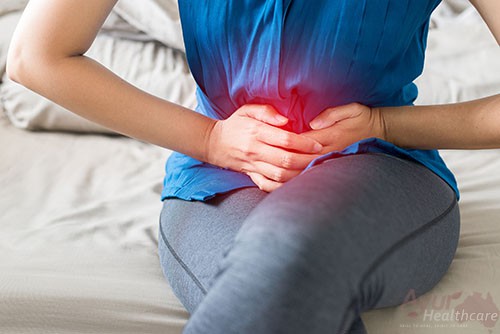
Dysmenorrhea is a medical term used for the pain that occurs during menstruation, specifically in the area of lower abdomen. Menstruation involves contraction of the uterine walls, which may lead to the blockage of blood vessels, tissue death and hence, causes pain in the lower abdomen which many women experience just before or during the menstrual periods.
The intensity and severity of the condition may range from annoying or a discomfort to more severe so that it interferes with everyday activities for a few days every month. While it may be seen in most women without any underlying pathology, there may be identifiable problems underneath which includes endometriosis or uterine fibroids.
Other signs and symptoms include: back pain, nausea, fatigue, headache and dizziness.
TREATMENT
Our ancient acharayas has mentioned several classical ayurvedic formulations for the cure of dysmenorrhoea. Ayurvedic herbal, classical time tested medicines cures by establishing the equilibrium of tridosha (vata, pitta, kapha) and saptadhatus (tissue elements).
Kooplicat Ayurveda Hospital’s view to dysmenorrhea is as a doshic imbalance that can potentially be eliminated through balanced living that is characterized by appropriate personalised diet, herbal supplements, exercise, routine, yoga and meditation. We provide ultimate care and support to you in your journey of life as a female my making your monthly cycles stress free and easily manageable.
COMPUTER VISION SYNDROME

These days, many of us have jobs that require us to stare at computer screens for hours at a time. That can put a real strain on your eye as it requires a lot of effort from eye muscles. Working on a computer is more challenging to your eyes than reading a book or piece of paper, because a computer screen also adds the elements of screen contrast, flicker, and glare.
Computer Vision Syndrome (CVS), also referred to as Digital Eye Strain, describes a group of eye and vision-related problems that result from prolonged computer, tablet, e-reader and cell phone use. Many individuals experience eye discomfort and vision problems when viewing digital screens for extended periods and are most commonly seen in myopic or astigmatic individuals.
Symptoms are: eye strain, watering of eyes, dryness, itching, burning sensation and redness of eyes, head ache, neck and shoulder pain.
TREATMENT
It is an accepted truth that our food and habits determine what we are. The habits that are accustomed by the person is the main cause for the condition and Ayurveda recommends to eliminate the cause at first place for the complete recovery.
Kooplicat Ayurveda Hospital has incorporated cooling and rejuvenating therapies for eyes affected by bright light, high voltage electric spark, and heat exposure along with eradicating the root cause of the disease. Local therapies and medication for nourishment along with customised ayurvedic diet are also provided to enhance your quality of life as well.
ASTHMA
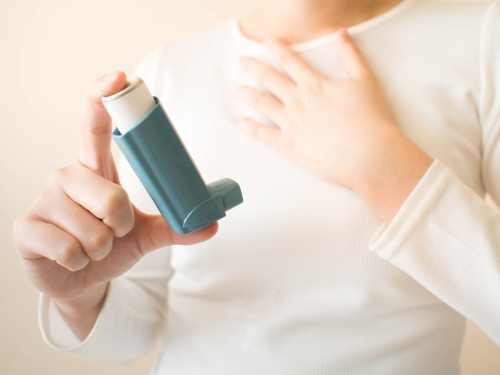
Asthma is a chronic inflammatory disease of the airways into the lungs presented to as difficulty in breathing. Symptoms vary in severity and frequency from person to person and may occur several times in a day or week in affected individuals, and for some people it may become worse during physical activity or at night.
During an asthma attack, the lining of bronchial tubes swell, causing the airways to narrow, reducing the flow of air into and out of lungs causing the muscles around to tighten which increases production of phlegm and difficulty to breathe assosciated with cough, wheezing and chest tightness. Recurrent asthma symptoms frequently can cause sleeplessness, daytime fatigue, reduced activity levels and school and work absenteeism.
Causes of asthma:
- Strong genetic predisposition
- Allergens (such as dust and pollens)
- Cold air
- Physical exercise
- Extreme emotional arousal ( anger, fear)
- Drugs like aspirin
- Smoking
TREATMENT
Ayurveda focuses on removing the triggering factors and all the causes which flares up the condition. The aim of treatment is to move the excess kapha back to stomach and then eliminate it through external and internal therapies.
Kooplicat Ayurveda Hospital takes an initiative to provide you everything personalised based on your body constitution, severity and cause. We emphasise on using specific drugs and drug combinations along with customised diet plan to improve better quality of life and to prevent recurrence of disease.
COUGH
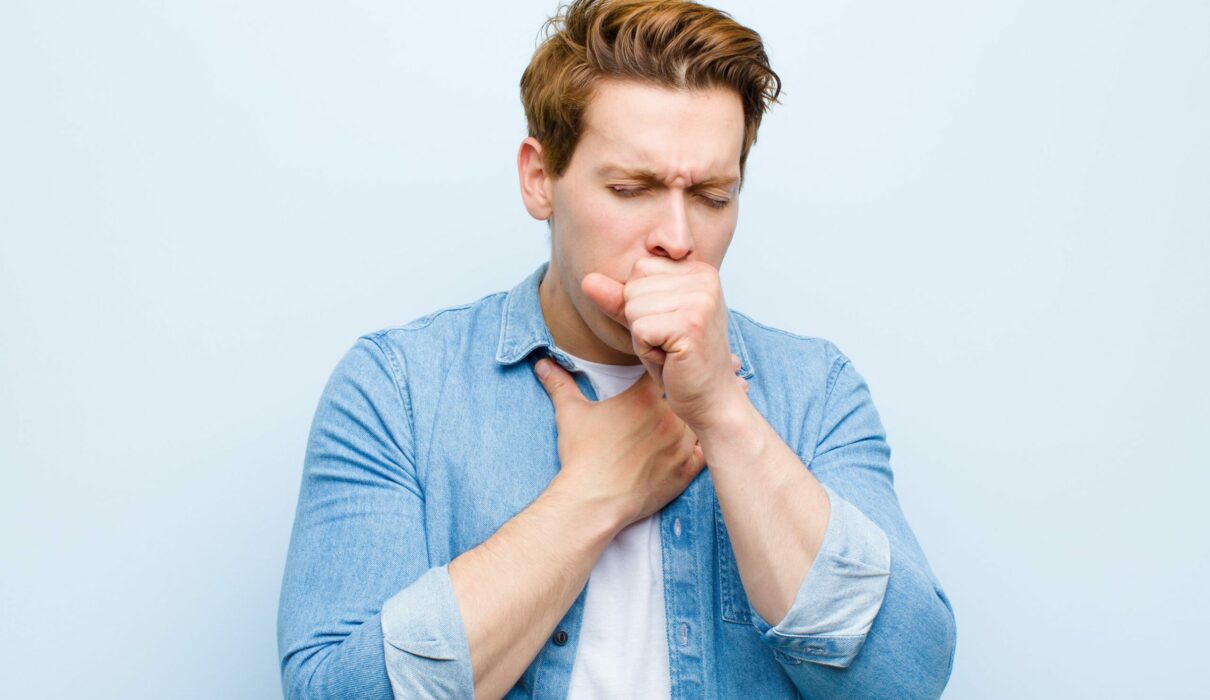
A cough is supposed to protect and help you heal. It gets out stuff that doesn’t belong in your lungs and windpipe, like inhaled dirt or food. But if somebody coughs a lot, it can be a sign of a disease.
Cough, also known as tussis, is a voluntary or involuntary act that clears the throat and breathing passage of foreign particles, microbes, irritants, fluids, and mucus; it is a rapid expulsion of air from the lungs.
Coughs can be either acute or chronic. Acute coughs begin suddenly and usually last no more than 2 to 3 weeks. Acute coughs are the kind you most often get with a cold, flu, or acute bronchitis. Chronic coughs last longer than 2 to 3 weeks. Causes of chronic cough include:
- Chronic bronchitis
- Asthma
- Allergies
- COPD (chronic obstructive pulmonary disease)
- GERD (gastroesophageal reflux disease)
- Smoking
- Throat disorders, such as croup in young children
- Some medicines
AYURVEDA AND COUGH
According to Ayurveda , Kasa (Cough) is the disease or symptom of respiratory tract occurring due to obstruction of Vata dosha (basic body element) and its reverse movement. Rough exercises, dry and rough foods, suppression of natural urges are also considered to be the causes of cough, in addition.
TREATMENT
As per Ayurveda, it is said to eliminate the cause first and then treat the disease. It does not merely consider the symptoms alone. After eradicating the cause, all the vitiated doshas (basic elements) needs to be brought back to harmony for recovery.
We Kooplicat Ayurveda hospital team helps you to achieve this through customised treatments, internal medications and strict ayurvedic diet that are decided based on the body constitution of each individual. We also help you to incorporate certain habits and regimen that will help to prevent the recurrence of the disease in future.